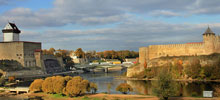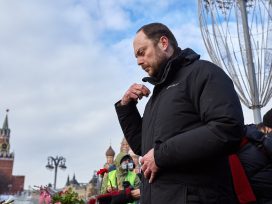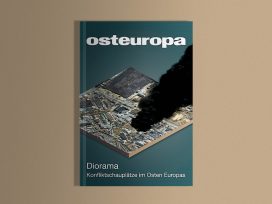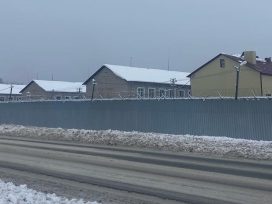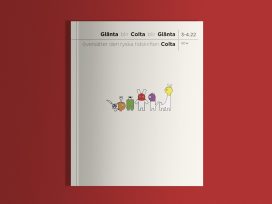The relationship between Russia and Europe is often – on both sides – described as a conflict of values: in one version it is the traditional bastion Russia vs decadent Gayropa; in another it is the bureaucratic but lawful Brussels labyrinth vs the autocratic Kremlin matrix where “nothing is true and everything is possible”, as Peter Pomerantsev puts it in his analysis of the value-laden nihilism of Putin’s Russia. It is in the context of this media-driven hybrid war that Putin’s chief spin doctor Dmitry Kiselyov, without the slightest hesitation or irony, can claim that Swedish children are encouraged to have sex from the age of nine. “Fortunately”, Kiselyov added in the weekly show
Vesti on the state television channel Rossiya, “they suffer from erectile dysfunction from the age of twelve. European values by all means – that’s the way it works”. Or as Russia’s foreign minister Sergey Lavrov recently commented: “If the West’s view of human rights develops towards general licentiousness, they are ignoring the fact that this is contrary to the foundations of our culture, which are based on orthodox religion – Christianity.”
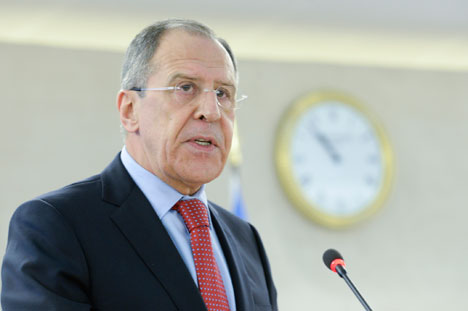
Sergey Lavrov makes an appearance during the High Level Segment of the 25th Session of the Human Rights Council in Geneva, 3 March 2014 – just days before Russia annexed Crimea on 18 March 2014. Photo: United Nations / Jean-Marc Ferr. Source: Flickr
However, parallel to this discussion of values, there is – at least since Crimea 2014 – a new set of very concrete security concerns raised by Russia’s European neighbours.
Has Russia under Vladimir Putin become a threat to security in Europe? Is there a risk that Russia will engage in military action against an EU member state, for example Estonia or Latvia, or even Poland? “If I wanted, in two days I could have Russian troops not only in Kiev, but also in Riga, Vilnius, Tallinn, Warsaw and Bucharest”, Putin allegedly told Ukrainian president Petro Poroshenko in September 2014, as reported in the Süddeutsche Zeitung. True or not, recent provocative military exercises and other activities in the Baltics have made even a stably neutral country like Sweden – reluctantly and cautiously, but still – start a broad discussion on the possibility of NATO membership; something that was absolutely unthinkable just a few years ago.
Quite worrying, you might think. In fact, it’s much worse. However justified such security concerns might be, the basic question is wrongly posed. A brief look at the way the European security order has actually been formulated in the last two centuries makes clear why.
Two hundred years ago, a new European security doctrine was negotiated in the Vienna Hofburg. Aiming to settle a range of critical issues resulting from the French Revolution and the Napoleonic Wars, the outcome of the Congress of Vienna was twofold: the preservation of political equilibrium among the great European powers and the restoration of the old dynasties that had been ousted by the revolutionary wave. The agreement signed in 1815 thus confirmed that the big countries had certain legitimate interests and established specific spheres of influence; that is, geographical areas regarded as “belonging” to one or the other of the great powers, independent of the “real” – at the time often defined as national – interests of these regions.
The European order described in the Helsinki Final Act, signed 160 years later, on 1 August 1975, is very different from that of the Congress of Vienna. In fact, it is the absolute opposite. In the very first paragraph of this declaration of the Conference on Security and Co-operation in Europe (CSCE, the predecessor of the OSCE), special emphasis is put on the equality of states.
The participating States will respect each other’s sovereign equality and individuality as well as all the rights inherent in and encompassed by its sovereignty, including in particular the right of every State to juridical equality, to territorial integrity and to freedom and political independence. They will also respect each other’s right freely to choose and develop its political, social, economic and cultural systems as well as its right to determine its laws and regulations.
From the perspective of the Soviet Union, this was considered to be a great success, since it meant that the West finally accepted the new borders that had been drawn in Europe after the end of World War II. A few years earlier, the West-German chancellor Willy Brandt had developed his Neue Ostpolitik (New Eastern Policy), which included rapprochement with East Germany (earning him the Nobel Peace Prize in 1971). The Helsinki Final Act was confirmation of this new approach and Pravda praised Brezhnev and printed the Helsinki text in full. Little did they know that the wording of this document would be the “Trojan Horse” that eventually provided inspiration for both Charta 77 in Czechoslovakia and Solidarno in Poland, and thus contributed significantly to developments that culminated in the revolutions in eastern Europe, the fall of the Berlin Wall and the end of the Soviet Empire.
The Helsinki Final Act also notes the right of every state to enter into whatever relation it wants with any other state or organization, be it trade agreements or military alliances:
Within the framework of international law, all the participating States have equal rights and duties. They will respect each other’s right to define and conduct as it wishes its relations with other States in accordance with international law and in the spirit of the present Declaration. They consider that their frontiers can be changed, in accordance with international law, by peaceful means and by agreement. They also have the right to belong or not to belong to international organizations, to be or not to be a party to bilateral or multilateral treaties including the right to be or not to be a party to treaties of alliance; they also have the right to neutrality.
Other sections are dedicated to the inviolability of frontiers and the right to self-determination; for example paragraph VIII, which states that
by virtue of the principle of equal rights and self-determination of peoples, all peoples always have the right, in full freedom, to determine, when and as they wish, their internal and external political status, without external interference, and to pursue as they wish their political, economic, social and cultural development.
In November 1990, the vast majority of the states participating in the CSCE signed the Charter of Paris for a New Europe, reaffirming the core principles of the Helsinki Accords, including
the equal rights of peoples and their right to self-determination in conformity with the Charter of the United Nations and with the relevant norms of international law, including those relating to territorial integrity of States.
This document also makes clear that “non-compliance with obligations under the Charter of the United Nations constitutes a violation of international law”.
After the collapse of the Soviet Union, the new security situation in Europe was specified still further. In the so-called Budapest Document (not to be confused with the Budapest Memorandum), the core principle of the European post-Cold War order is spelled out with astounding clarity. This declaration was made by the CSCE Summit of Heads of State or Governments on behalf of all participating states, including Russia, in December 1994. Under the heading “Towards a Genuine Partnership in a New Era” it states that:
The CSCE’s democratic values are fundamental to our goal of a community of nations with no divisions, old or new, in which the sovereign equality and the independence of all States are fully respected, there are no spheres of influence and the human rights and fundamental freedoms of all individuals, regardless of race, colour, sex, language, religion, social origin or of belonging to a minority, are vigorously protected.
Notwithstanding that what is described here is a goal, not an actual state of affairs, it is difficult to imagine a less ambiguous formulation. Again: there are no spheres of influence! It is not only 200 years that separate this from the Congress of Vienna – it is another universe.
And yet, today the ideas of old are coming back into fashion. Talk of “legitimate interests” and “spheres of influence” is the new black, not only in Russia, and the events in Ukraine have shown that the inviolability of borders and the “principle of equal rights and self-determination of peoples” are far from self-evident. The restoration of old (super-)power structures that fell victim to the revolutions in the wake of the Autumn of Nations 1989 has become part of a geopolitical agenda that aims to turn the European post-Cold War order on its head. Or has already done so.
When in 2005 Russian president Vladimir Putin confessed that he found the collapse of the Soviet Union to be a geopolitical catastrophe, he shocked the western world: how could anyone regret the fall of a system that brought so much suffering to so many people? But as telling as it is, this quotation has often been misrepresented. It reads in full:
Above all, we should acknowledge that the collapse of the Soviet Union was a major geopolitical disaster of the century. As for the Russian nation, it became a genuine drama. Tens of millions of our co-citizens and co-patriots found themselves outside Russian territory. Moreover, the epidemic of disintegration infected Russia itself.
It is clearly wrong to interpret this as evidence that Putin was bemoaning the loss of the communist economic and political system. No, it was the collapse of the Russian state itself he mourned. And its greatness. His doctrine is about interior stability – and, on the level of foreign policy, the restoration of Russia’s status as a geopolitical superpower (not just a “regional power”, as US president Barack Obama dismissively referred to Russia).
In fact, Putin symptomatically prefers to speak about Russia as a “great power” rather than a superpower. In a deliverance much less quoted but more revealing than the 2005 “geopolitical disaster” speech, Putin clearly describes how he sees Russia’s role in the world and that he intends to act accordingly. Already in August 1999, when Putin was about to become prime minister, he told the representatives of the Duma, and the rest of the world, that
Russia has been a great power for centuries, and remains so. It has always had and still has legitimate zones of interest abroad in both the former Soviet lands and elsewhere. We should not drop our guard in this respect, neither should we allow our opinion to be ignored.
There it is again: legitimate zones of interest. It is crystal clear that Putin sees post-Soviet space – and beyond – as the fief of Russia. Russia wants influence in its backyard. The problem is that the post-Cold War order is built on the fact that there are no backyards. Or it was.
The invasion of Georgia in 2008, the annexation of Crimea in 2014 and the subsequent – ongoing – war in south-east Ukraine are events that have seriously undermined or even nullified the European security order as defined in and constituted by documents such as the Helsinki Final Act, the Paris Charter and the Budapest Document – all foundational documents of the Organisation for Security and Co-operation in Europe, which counts 57 participating states, including Russia.
This means that, de facto, European security, as we know it, no longer exists. In this situation, to ask whether Russia poses a danger to this order becomes meaningless. There is nothing potential about the current situation; there is no threat. There is a fact.
Today, after the fall of the Soviet Empire and in a moment of historical irony, what Karl Schlögel calls the renegotiation of the legacy of the Russian Empire is back on the agenda. Some of the issues at stake, however, have already been settled – far away from the negotiating table.
Vienna, April 2016

